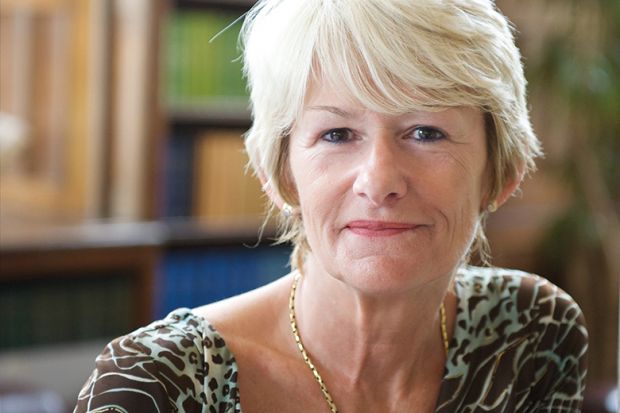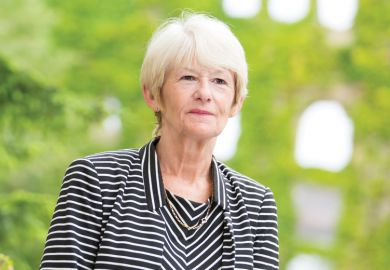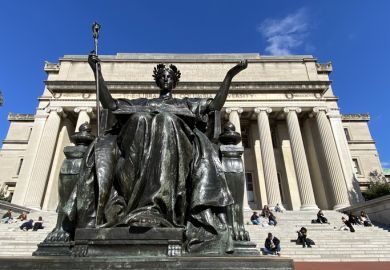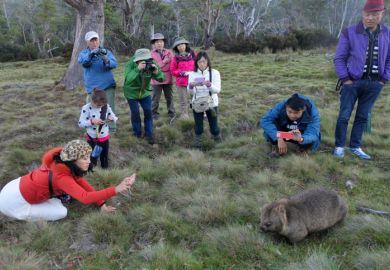The new chair of the Russell Group is urging the UK government to bring in “sustainable” research funding and make the assessment system “more agile”, as well as calling for stronger international research partnerships between the UK and growing powerhouses such as China.
Dame Nancy Rothwell, the University of Manchester vice-chancellor, who became chair of the group of 24 research-intensive universities in September, told Times Higher Education there was “complete uncertainty” over international student numbers amid travel and visa disruption during the Covid-19 crisis, spotlighting the major issue of cross-subsidy for research funding from overseas fees.
Asked what key messages she has been stressing to the government in her new role, Dame Nancy said Russell Group institutions faced a “potential struggle with international students” and were “very worried about maintaining the research base”.
“They [ministers] are very aware of that; they’re very receptive to [that argument],” Dame Nancy said.
“We absolutely want to contribute to the recovery, to building back better, to the British economy, to net zero, to levelling up – these are all things the Russell Group feel we can really, really help with…We can make an even bigger contribution than we’ve done previously.”
Asked what Russell Group universities would hope to see in the government’s Comprehensive Spending Review, the autumn exercise that will set out spending plans for the next three years, Dame Nancy, a long-serving professor of physiology at Manchester, said the “long-term sustainability of research is going to be key to the agenda”.
That means addressing the cross-subsidy issue “but also looking at international collaboration and partnerships as Brexit evolves” – she has previously said Russell Group universities were “making an assumption” that the UK will not join the European Union’s next research programme, Horizon Europe – plus “identifying where UK research can really be a global leader – and there are many areas where it can”.
Dame Nancy also called for a “bit more agility and less bureaucracy” in the research funding system. The government recently announced a review aimed at reducing higher education’s bureaucracy, including in research, while Dame Nancy has previously called for changes to the research excellence framework.
“There are ways we could do it that would be less intensive,” she said. “For example, we could do random sampling without having to look at every single individual.”
On research funding, Dame Nancy said the Covid crisis “has highlighted a long-standing issue: research has been funded at just over 70 per cent [of full cost], and that [remainder] has been cross-subsidised.
“And not just from international students, [but also] from residences, from philanthropy, from commercial, conferences – all of which have declined; all those income streams are under threat. That has the potential for leaving a big hole in research.”
That was “well realised” in government and there are “longer-term discussions ongoing as part of the Comprehensive Spending Review”, she added.
She also called for the UK to strike research partnerships with nations such as the US, China and other Asian countries – something that could become even more crucial if the UK does not join Horizon Europe.
“China has now become a real research powerhouse…There are many areas in which China is starting to outstrip the West,” Dame Nancy said. “To not have a partnership, I think, would be a mistake. Universities, research and students are incredibly important for soft diplomacy.”
She added: “We can’t ignore China…we have to find ways to work with China.”
Of the Russell Group, Dame Nancy said it was “not a formal alliance”. Instead, it focused on “sharing experiences and looking at how we can do things collectively” – but it “does have the ear of government” through its universities’ research power and national economic contribution, she added.
Many UK universities, including Manchester, have warned of potential job losses if the crisis brings further severe financial impacts – with particular concern from unions about fixed-term contract staff not seeing their jobs renewed.
Does the crisis mean fewer academics working in UK universities?
“I hope we won’t have a smaller academic workforce…Universities are preparing for the worst – hopefully it won’t happen – and not taking on as many staff in the event we might see a big loss of income,” Dame Nancy replied.
But the UK government is committed to a big increase in research funding “and if, as we hope, British students and international students do come, I don’t see any reason for a reduction in the workforce in higher education,” she added.
POSTSCRIPT:
Print headline: New chair of Russell Group flags fears for research base
Register to continue
Why register?
- Registration is free and only takes a moment
- Once registered, you can read 3 articles a month
- Sign up for our newsletter
Subscribe
Or subscribe for unlimited access to:
- Unlimited access to news, views, insights & reviews
- Digital editions
- Digital access to THE’s university and college rankings analysis
Already registered or a current subscriber? Login







